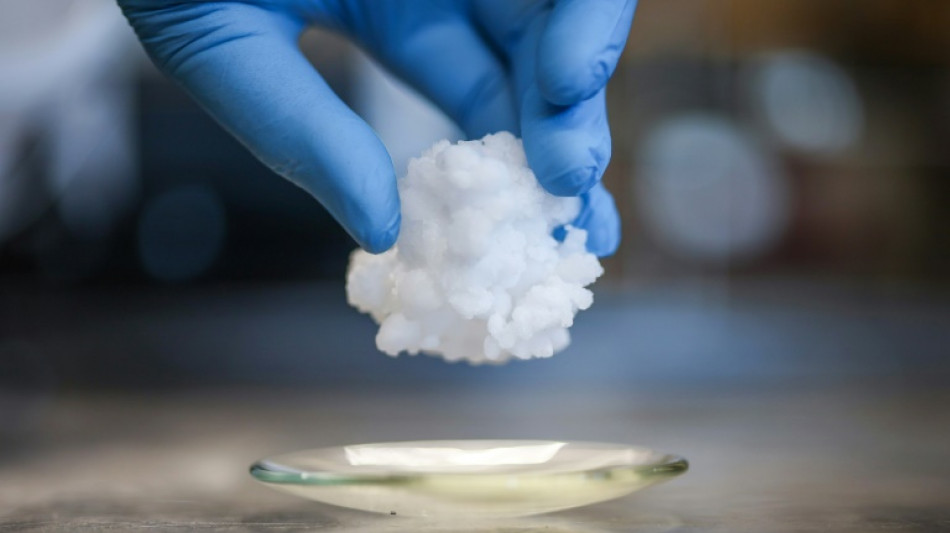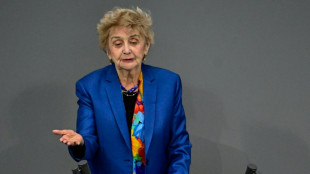
-
 Rockets veteran Adams out for rest of NBA season
Rockets veteran Adams out for rest of NBA season
-
Holders PSG happy to take 'long route' via Champions League play-offs

-
 French Senate adopts bill to return colonial-era art
French Senate adopts bill to return colonial-era art
-
Allrounder Molineux named Australian women's cricket captain

-
 Sabalenka faces Svitolina roadblock in Melbourne final quest
Sabalenka faces Svitolina roadblock in Melbourne final quest
-
Barcelona rout Copenhagen to reach Champions League last 16

-
 Liverpool, Man City and Barcelona ease into Champions League last 16
Liverpool, Man City and Barcelona ease into Champions League last 16
-
Tesla profits tumble on lower EV sales, AI spending surge

-
 Real Madrid face Champions League play-off after Benfica loss
Real Madrid face Champions League play-off after Benfica loss
-
LA mayor urges US to reassure visiting World Cup fans

-
 Madrid condemned to Champions League play-off after Benfica loss
Madrid condemned to Champions League play-off after Benfica loss
-
Meta shares jump on strong earnings report

-
 Haaland ends barren run as Man City reach Champions League last 16
Haaland ends barren run as Man City reach Champions League last 16
-
PSG and Newcastle drop into Champions League play-offs after stalemate

-
 Salah ends drought as Liverpool hit Qarabag for six to reach Champions League last 16
Salah ends drought as Liverpool hit Qarabag for six to reach Champions League last 16
-
Barca rout Copenhagen to reach Champions League last 16

-
 Arsenal complete Champions League clean sweep for top spot
Arsenal complete Champions League clean sweep for top spot
-
Kolo Muani and Solanke send Spurs into Champions League last 16

-
 Bayern inflict Kane-ful Champions League defeat on PSV
Bayern inflict Kane-ful Champions League defeat on PSV
-
Pedro double fires Chelsea into Champions League last 16, dumps out Napoli

-
 US stocks move sideways, shruggging off low-key Fed meeting
US stocks move sideways, shruggging off low-key Fed meeting
-
US capital Washington under fire after massive sewage leak

-
 Anti-immigration protesters force climbdown in Sundance documentary
Anti-immigration protesters force climbdown in Sundance documentary
-
US ambassador says no ICE patrols at Winter Olympics

-
 Norway's Kristoffersen wins Schladming slalom
Norway's Kristoffersen wins Schladming slalom
-
Springsteen releases fiery ode to Minneapolis shooting victims

-
 Brady latest to blast Belichick Hall of Fame snub
Brady latest to blast Belichick Hall of Fame snub
-
Trump battles Minneapolis shooting fallout as agents put on leave

-
 SpaceX eyes IPO timed to planet alignment and Musk birthday: report
SpaceX eyes IPO timed to planet alignment and Musk birthday: report
-
White House, Slovakia deny report on Trump's mental state

-
 Iran vows to resist any US attack, insists ready for nuclear deal
Iran vows to resist any US attack, insists ready for nuclear deal
-
Colombia leader offers talks to end trade war with Ecuador

-
 Former Masters champ Reed returning to PGA Tour from LIV
Former Masters champ Reed returning to PGA Tour from LIV
-
US Fed holds interest rates steady, defying Trump pressure

-
 Norway's McGrath tops first leg of Schladming slalom
Norway's McGrath tops first leg of Schladming slalom
-
Iraq PM candidate Maliki denounces Trump's 'blatant' interference

-
 Neil Young gifts music to Greenland residents for stress relief
Neil Young gifts music to Greenland residents for stress relief
-
Rubio upbeat on Venezuela cooperation but wields stick

-
 'No. 1 fan': Rapper Minaj backs Trump
'No. 1 fan': Rapper Minaj backs Trump
-
Fear in Sicilian town as vast landslide risks widening

-
 'Forced disappearance' probe opened against Colombian cycling star Herrera
'Forced disappearance' probe opened against Colombian cycling star Herrera
-
Seifert, Santner give New Zealand consolation T20 win over India

-
 King Charles III warns world 'going backwards' in climate fight
King Charles III warns world 'going backwards' in climate fight
-
Minneapolis activists track Trump's immigration enforcers

-
 Court orders Dutch to protect Caribbean island from climate change
Court orders Dutch to protect Caribbean island from climate change
-
Sterling agrees Chelsea exit after troubled spell

-
 Rules-based trade with US is 'over': Canada central bank head
Rules-based trade with US is 'over': Canada central bank head
-
Lucas Paqueta signs for Flamengo in record South American deal

-
 Holocaust survivor urges German MPs to tackle resurgent antisemitism
Holocaust survivor urges German MPs to tackle resurgent antisemitism
-
'Extraordinary' trove of ancient species found in China quarry


UK lab promises air-con revolution without polluting gases
The soft, waxy "solid refrigerant" being investigated in a UK laboratory may not look very exciting, but its unusual properties promise an air-conditioning revolution that could eliminate the need for greenhouse gases.
The substance's temperature can vary by more than 50 degrees Celsius (90 degrees Fahrenheit) under pressure, and unlike the gases currently used in appliances solid refrigerants, it does not leak.
"They don't contribute to global warming, but also they are potentially more energy efficient," Xavier Moya, a professor of materials physics at the University of Cambridge, told AFP.
Approximately two billion air-conditioner units are in use worldwide, and their number is increasing as the planet warms.
Between leaks and energy consumption, the emissions associated with them are also increasing each year, according to the International Energy Agency (IEA).
Moya has been studying the properties of these plastic crystals in his laboratory at the prestigious UK university for 15 years.
On his work surface, a large red and grey machine, topped with a cylinder, tests how the temperature of a substance changes under pressure.
The aim is to identify the best refrigerants among this class of materials, which are already used by the chemical industry and are relatively easy to obtain, even if the exact composition of the crystals eventually selected remains secret.
The phenomenon is invisible to the naked eye, but these crystals are composed of molecules that spin on their own axis.
When the substance is squeezed, that movement stops and the energy is dissipated in the form of heat.
When released, the substance cools its surroundings in what is known as the "barocaloric effect".
- Chilled cans -
"We're expecting demand for air conditioning to increase hugely, globally, between now and 2050," Cliff Elwell, a professor of building physics at University College London, told AFP.
He believes barocaloric solids have the potential to be as efficient as gas, if not more so.
"But whatever we introduce as new technologies always has to hit the basic requirements," which include being compact and quiet enough for use in homes and cars, he said.
Alongside his research at Cambridge, Moya founded the startup Barocal in 2019 to turn his research group's discoveries into tangible products.
It employs nine people and has its own laboratory, which is currently a modest container in a parking lot.
But the startup is attracting interest and in recent years has raised around €4 million ($4.5 million), notably from the European Innovation Council -- an EU program involving the UK -- and Breakthrough Energy, an umbrella group of initiatives founded by US billionaire Bill Gates to reduce greenhouse gas emissions.
It plans to increase its workforce to 25 or 30 this year.
The first air-conditioner prototype is the size of a large suitcase and hums quite loudly when a hydraulic circuit increases or decreases the pressure inside the four crystal-filled cylinders. But it works.
A small refrigerator is attached to the system, and the cans of soda inside are perfectly chilled.
- Cheaper bills -
The prototype has "not really been optimised yet for either mass, volume, or even sound", acknowledged Mohsen Elabbadi, a materials engineer at Barocal.
But the performance of the units they are working to perfect will eventually be comparable with those running on gas, he promised.
While the company is currently focusing on cooling, the technology could also be used to produce heat.
Several teams are studying these materials around the world, but the Cambridge team is a pioneer in the field, according to Breakthrough Energy, which estimates that these devices have the potential to reduce emissions by up to 75 percent compared with traditional units.
Barocal hopes to launch a first product on the market within three years, according to commercial director Florian Schabus.
These will initially be cooling units for "large shopping centres, warehouses, schools" and even "data centres", he said.
The company reasons that the ultimate promise of cheaper bills will convince businesses to stump up the higher initial costs.
Barocal is eventually aiming for retail prices similar to traditional units, allowing it to launch in the residential market.
R.Buehler--VB



